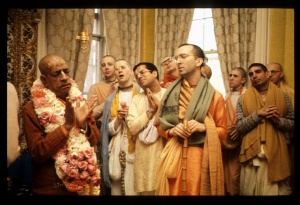SB 5.10.24

A.C. Bhaktivedanta Swami Prabhupada
TEXT 24
- tan me bhavān nara-devābhimāna-
- madena tucchīkṛta-sattamasya
- kṛṣīṣṭa maitrī-dṛśam ārta-bandho
- yathā tare sad-avadhyānam aṁhaḥ
SYNONYMS
tat — therefore; me — unto me; bhavān — your good self; nara-deva-abhimāna-madena — by madness due to having the body of a king and thus being proud of it; tucchīkṛta — who has insulted; sat-tamasya — you who are the best among human beings; kṛṣīṣṭa — kindly show; maitrī-dṛśam — your causeless mercy upon me like a friend; ārta-bandho — O friend of all distressed persons; yathā — so; tare — I can get relief from; sat-avadhyānam — neglecting a great personality like you; aṁhaḥ — the sin.
TRANSLATION
Whatever you have spoken appears to me to be contradictory. O best friend of the distressed, I have committed a great offense by insulting you. I was puffed up with false prestige due to possessing the body of a king. For this I have certainly become an offender. Therefore I pray that you kindly glance at me with your causeless mercy. If you do so, I can be relieved from sinful activities brought about by insulting you.
PURPORT
Śrī Caitanya Mahāprabhu has said that by offending a Vaiṣṇava, one finishes all his spiritual activities. Offending a Vaiṣṇava is considered the mad elephant offense. A mad elephant can destroy an entire garden which has been developed with great labor. One may attain the topmost platform of devotional service, but somehow or other if he offends a Vaiṣṇava, the whole structure collapses. Unconsciously, King Rahūgaṇa offended Jaḍa Bharata, but due to his good sense, he asked to be excused. This is the process by which one can be relieved from a vaiṣṇava-aparādha. Kṛṣṇa is always very simple and by nature merciful. When one commits an offense at the feet of a Vaiṣṇava, one must immediately apologize to such a personality so that his spiritual advancement may not be hampered.